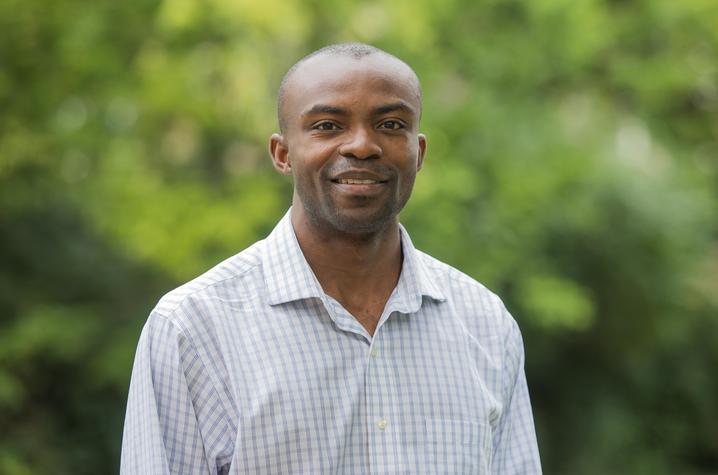UK researchers create new cancer fighting compound

LEXINGTON, Ky. (Oct. 26, 2022) — A University of Kentucky Markey Cancer Center researcher’s team developed new chemical compounds that show promise as a potential anticancer therapy to treat aggressive tumors.
The study led by Samuel G. Awuah, Ph.D., was published in Chemical Communications with Adedamola Arojojoye, a graduate student in Awuah’s lab as the paper’s first author.
The new gold-derived compounds created by Awuah’s lab were toxic to cancer cells but well-tolerated by mice, giving them potential in the development of new cancer drugs that could make it to the clinic.
Many metal-based therapies have proven to be effective against cancer, with platinum-based drugs a first line chemotherapy for testicular, bladder, lung, colon and ovarian cancers. Some metal-based compounds, like gold(III), have promise as anticancer agents, but lack the stability needed to continue therapeutic development.
Awuah’s lab synthesized a new class of gold(III), which had a different structure that was more tolerant to therapeutic use.
In the lab, the new chiral gold(III) compounds were studied on a panel of cancer cell lines to test their effectiveness and understand how they attack cancer cells.
The compounds showed anticancer activity against aggressive triple negative breast cancer cells. They also possessed a new mechanism that caused the cells’ mitochondria to dysfunction.
Awuah says developing drugs that cause mitochondria dysfunction to deprive cancer cells of energy is a new relevant strategy to inhibit cancer growth that would be useful in combination with existing therapies.
“Continuing to develop gold-based compounds has the potential to generate new mechanisms of drug action and understanding how they alter cancer cells has significant implications in drug design and is clinically relevant,” Awuah said.
Awuah is an assistant professor in the College of Arts and Sciences’ Department of Chemistry and holds a joint appointment in the College of Pharmacy’s Department of Pharmaceutical Sciences. His lab focuses on developing new methods to create chemical tools that interrogate complex biological processes as therapeutics for several diseases, including cancer.
Research reported in this publication was supported by the National Cancer Institute of the National Institutes of Health under Award Number R01CA258421. The content is solely the responsibility of the authors and does not necessarily represent the official views of the National Institutes of Health.
As the state’s flagship, land-grant institution, the University of Kentucky exists to advance the Commonwealth. We do that by preparing the next generation of leaders — placing students at the heart of everything we do — and transforming the lives of Kentuckians through education, research and creative work, service and health care. We pride ourselves on being a catalyst for breakthroughs and a force for healing, a place where ingenuity unfolds. It's all made possible by our people — visionaries, disruptors and pioneers — who make up 200 academic programs, a $476.5 million research and development enterprise and a world-class medical center, all on one campus.




